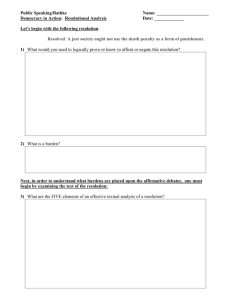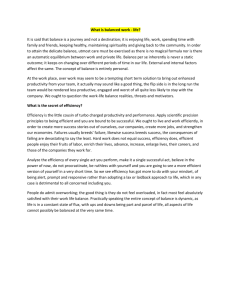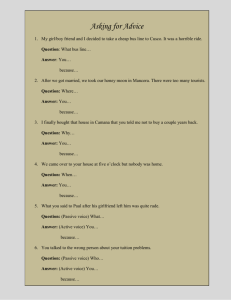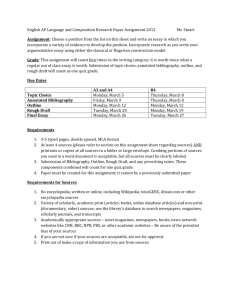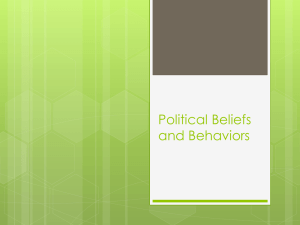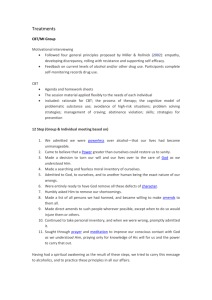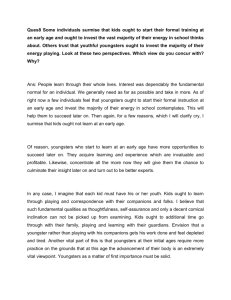2 Everett, D. (2012). Language. The Cultural Tool
advertisement
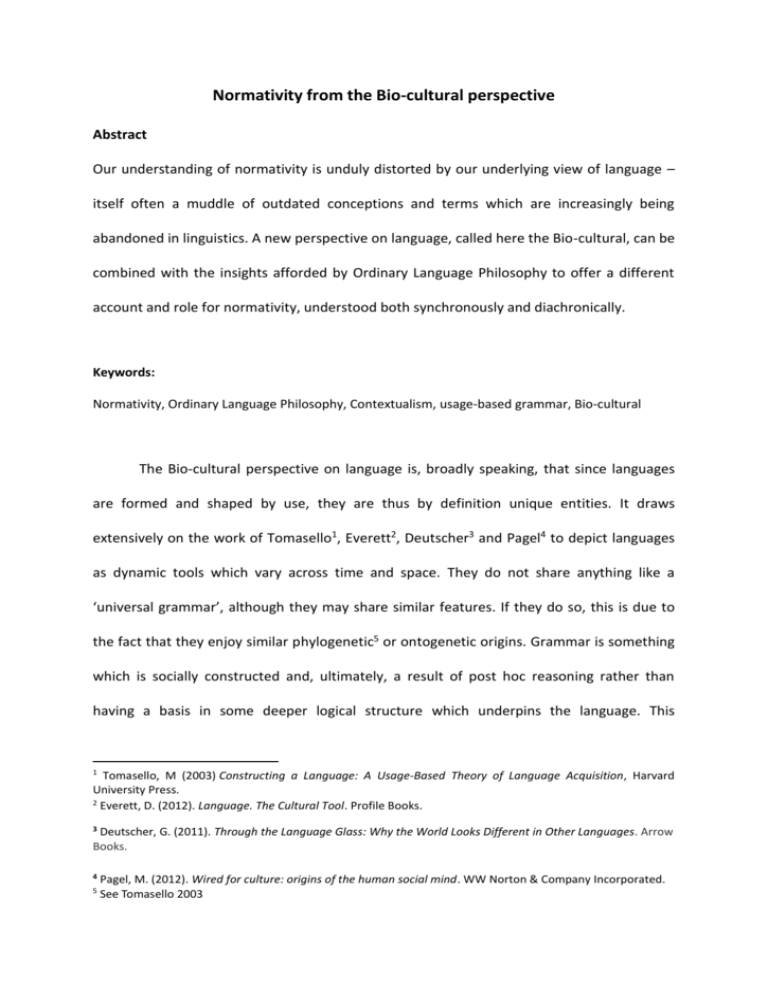
Normativity from the Bio-cultural perspective Abstract Our understanding of normativity is unduly distorted by our underlying view of language – itself often a muddle of outdated conceptions and terms which are increasingly being abandoned in linguistics. A new perspective on language, called here the Bio-cultural, can be combined with the insights afforded by Ordinary Language Philosophy to offer a different account and role for normativity, understood both synchronously and diachronically. Keywords: Normativity, Ordinary Language Philosophy, Contextualism, usage-based grammar, Bio-cultural The Bio-cultural perspective on language is, broadly speaking, that since languages are formed and shaped by use, they are thus by definition unique entities. It draws extensively on the work of Tomasello1, Everett2, Deutscher3 and Pagel4 to depict languages as dynamic tools which vary across time and space. They do not share anything like a ‘universal grammar’, although they may share similar features. If they do so, this is due to the fact that they enjoy similar phylogenetic5 or ontogenetic origins. Grammar is something which is socially constructed and, ultimately, a result of post hoc reasoning rather than having a basis in some deeper logical structure which underpins the language. This 1 Tomasello, M (2003) Constructing a Language: A Usage-Based Theory of Language Acquisition, Harvard University Press. 2 Everett, D. (2012). Language. The Cultural Tool. Profile Books. 3 Deutscher, G. (2011). Through the Language Glass: Why the World Looks Different in Other Languages. Arrow Books. 4 5 Pagel, M. (2012). Wired for culture: origins of the human social mind. WW Norton & Company Incorporated. See Tomasello 2003 perspective, when combined with a reinvigorated and restated version of Ordinary Language Philosophy, has much to offer, especially with regards the thorny issue of normativity. Before proceeding, it should perhaps be stressed that I am not attempting here to revive Ordinary Language Philosophy entirely nor embark upon its defence. Rather, like Avner Baz in his recent work When Words Are Called For, I seek to utilise what is perhaps the key insight afforded by this group: that many philosophers do not use words correctly. This is a very blunt way of expressing something far more subtle. As Baz himself puts it: “the traditional philosopher expects something of his words that – given the work we ordinarily and normally do by means of them and the conditions under which it may successfully be done – should not be expected of them. He thereby saddles himself with difficulties that derive whatever force they seem to have from that very expectation”.6 Now, this is not to deny philosophical discourse the ability to refine terms, to emphasise aspects of their meaning over others but rather to investigate whether the term is being used in a manner which goes too far beyond the pale. Thus perhaps the main insight from OLP is that no understanding of a term is complete without an account of its use and, therefore, the two are inseparable. Ought itself is a curiosity, a term much loved in philosophy and linguistics yet curiously largely absent from the language of everyday. Let us then, in the spirit of OLP, provide a brief overview of how ought is used and thus see to what extent it is being abused by philosophers and linguists alike. This, it should be stressed, is in the spirit of Austin’s first step on the ladder: how ought is used in ordinary, everyday discourse is not intended to definitively establish whether ought is being used correctly or not. The intention is rather to 6 Baz, A. (2013). When Words Are Called For. Harvard University Press. p.4 indicate whether there is a considerable gap between how it is used in philosophical discourse and how it is used ordinarily. Corpus data is the obvious first port of call and reveals a striking picture in both British and American English. As Leech has noted in English Grammar for Today, the following picture emerges of ought in relation to other modals: Thus ought, in both spoken and written discourse and American and British English, seems to be something of a rara avis. Now, this could be explained away with the reasonable assumption that deontic statements are far less frequent in discourse than those concerning probability, for example – all modals generally used in deontic statements are to be found in the bottom half of the table. Yet even a simple comparison between should, must and ought reveals that the latter is very much in the minority and, what is more, it has been on the decline since at least the 1960’s – interestingly enough, when the debate over ought sprang to life. Now, however, as Leech notes, “Already in Present-day English we seem to be reaching a stage where some modals (shall, ought to, need) are reaching the end of their useful life” .7 Now, Swan claims that “Should and ought are very similar, and can often replace each another…Must has similar meanings to should and ought but is stronger or more definite. It expresses great confidence that something will happen, or that something is true; should and ought 7 Leech, G. (2003). Modality on the Move. Modality in Contemporary English. Walter de Gruyter. p.236 express less confidence”.8 This in itself is curious – where is the ‘ought’ in ought? Why do philosophers not concern themselves with should in the same manner? Earlier researchers, such as Swan or Deklerck, had suggested that “Although should and ought to are often interchangeable, there is a slight difference of meaning between them. When using should the speaker expresses his own subjective view; ought to is more objective and is used when the speaker wants to represent something as a law, duty or regulation. For this reason ought to may sound more emphatic than should.”9However, the research conducted by Capelle and De Sutter, based on the British National Corpus, has shown that this perceived or expected difference is problematic. After all “on what basis can we (objectively) decide for any two instances whether they are equally subjective/objective or whether one of them is more subjective/objective than the other?”10 and that, if anything, the opposite is true: ought to is more subjective than should. The matter becomes truly inexplicable when we consider the claims of Celce-Murcia and Larsen-Freeman who, as Capelle and De Sutter note, “claim that deontic should and deontic ought to contrast with each other in that the latter is more informal (most markedly so if it is phonologically reduced to oughta.)”11 This brief overview has shown that the philosophical applications of ought to do not match its “ordinary” use and, furthermore, that outside of a very narrow field of philosophical discourse, its use is in fact dying, either being replaced by should or other deontic modals or shifting in use towards a more epistemic utilisation. As Capelle and De Sutter note: “epistemic use of ought to seems to have increased in frequency since the early 8 Swan, M. (1995). Practical English Usage. 2nd edition. OUP. p.517 9 Deklerck, seen in Capelle, B & De Sutter, G. (2010). Should vs Ought to. [In] Bert Cappelle and Naoaki Wada (eds.), Distinctions in English Linguistics, Offered to Renaat Declerck. Tokyo: Kaitakusha. 10 Capelle, B & De Sutter, G. (2010). p.119 11 Capelle, B & De Sutter, G. (2010) p.101 1960s, from 21% in the LOB corpus (UK English) and 24% in the Brown corpus (US English), or from epistemic/deontic ratios of roughly 1:3 and roughly 1:5, respectively. Below is a table summarizing the differences between the “philosophical ought” and “ordinary ought”: Philosophical ought Ordinary ought More “objective” than should Less objective than should Largely deontic in use Increasingly epistemic.12 Distinct from should Identical in meaning although used more rarely Thus even this brief, OLP inspired analysis shows us that ought to is being used in a very different manner to how it is used in ordinary language, as represented by corpus data. Where has this misconception come from and where does the “normativity” reside in a modal verb which is (hardly) used deontically and, even when it is, is less objective that should? The answer lies in the inherent, cultural ambiguity of ought and it becoming separated from a culture of use which once gave it the normative sense which much of philosophy still believes it to hold. As Everett points out in Language: The Cultural Tool, culture plays an architectonic role in shaping language since it is sets out the foundations and superstructure upon which a language is created and develops. An appealing metaphor, it encapsulates the limitations and supports which culture lends to language, especially as it is also constructed by human activity. Let us turn now then to a brief examination of some 12 Various ratios have been reported for the epistemic/deontic use of ought from 1:8 (Coates), 1:32 (Collins) and 1:3 (Degani). All figures from Capeele and De Sutter (2010). of the cultural variations of ought in order to see how these superstructures vary from culture to culture and language to language. Now why is this important? The issue at stake is that if philosophical discourse has abstracted too far from the original meaning of ought in its deliberations yet still bases some of its conclusions on the original sense of the term, it is committing a considerable error. This is clearly an example of words going on holiday, being used improperly. It is compounded by the fact that the ur-Chomskyan view of language13 is essentially one dimensional, with ought apparently having one, fixed and stable meaning – and yet it analyses the term in decontextualized propositions which only serve to add to the ‘mystery’ of the modal. Contextualism and Ordinary Language Philosophy, on the other hand, insist on this context being sharply delineated in order to establish how the term is used. Let us consider, as a brief aside, Travis’ investigation of know in order to establish an analogy. Travis offers the following example: “Hugo, engrossed in the paper, says, ‘I need some milk for my coffee’. Odile replies, ‘You know where the milk is’. Suddenly defensive, Hugo replies: ‘Well, I don’t really know that, do I? Perhaps the cat broke into the refrigerator, or there was just now a very stealthy milk thief, or it evaporated or suddenly congealed’.”14 Now, the point of embedding the proposition ‘you know where the milk is’ in a broader context such as the story above may be used to reveal two aspects which are overlooked by 13 Broadly speaking, this is the near mythological belief in a ‘Universal Grammar’, a formal system which underpins all languages – something which is often attributed to Chomsky but which in fact he abandoned long ago. For more details on this and the emerging Bio-cultural perspective, see my paper The Perspectivist Account of the Normativity of Meaning Debate in The Many Faces of Normativity. 14 Travis, quoted in Baz (2013) p.147 the traditional view – one interpretation is offered by Contextualism whilst the other is Baz’s conception of Ordinary Language Philosophy. The traditional view would only be interested in the truth value of the statement ‘you know where the milk is’. Either Hugo ‘knows’ or not, the answer is the same regardless of the conditions and context in which the proposition is embedded. Contextualism, according to Baz, would claim that the answer is “sometimes ‘Yes’, sometimes ‘No’ and sometimes ‘The question is not determinate enough to be answered either correctly or incorrectly’”.15 Travis uses his example to show that propositional knowledge is at best incomplete and, at worst, ultimately empty. Baz and Ordinary Language Philosophy, on the other hand, take the analysis of the use of the proposition even further. As Baz urges us: “Go back to Odile’s words, however, and to the idea that she means them as a rebuke. Imagining her words in this way points to a generally neglected region of our concept of knowledge, one in which knowledge is a kind of liability, sometimes even a burden, and is the basis not for deference and respect, but for reproach, accusation and blame. Philosophers have almost invariably thought of knowledge as some sort of achievement that entitles us to certain things.” Thus the Ordinary Language Philosophy perspective clearly shows that there is an element to knowledge and knowing which is not normally accounted for in the traditional account – and, indeed, may be the source of some confusion – and, furthermore, that this analysis of the term reveals something about the use of know itself which undermines the validity of propositional knowledge. Baz convincingly argues the case that “unlike, say, a piece of furniture, a piece of knowledge is not something whose nature, and whose possession by someone, can philosophically safely be determined regardless of the specific point of the determination”. In other words, we need context if we are to understand how philosophical terms are used and, therefore, what they mean. 15 Ibid. p.150 This insight is a key one for any examination of ought: As with Baz’s consideration of know, we should now investigate whether there is a similarly neglected aspect of the modal which may be the source of this confusion and to establish whether ought is also a term which cannot be safely determined without a consideration of its context of use. Let us turn then, to a pursuit of the cultural and contextual environs of ought in order to see if this can furnish us with such data. The Biocultural Perspective Key to understanding the Bio-cultural perspective is in the inversion of the Saussurean langue and parole: rather than studying the fixed, apparently logical langue in a synchronous snapshot, the Bio-cultural is keen to engage in a dynamic view of language seen diachronically. It owes this move to the Russian linguist and philosopher, Valentin Voloshinov, who sought to challenge the rigid, fixed conception of meaning and, instead, ‘‘is prodding us to consider that even the apparently stable meanings we describe in a dictionary are really the crystallization of speech processes’’.16This view is strikingly similar to that advanced by Tomasello and the idea that grammar is nothing more than fossilized speech and what plays a largely unheralded role in meaning is that of context. As Allwood notes, this is no ordinary notion and is a largely unheralded one: “In spoken Swedish, 40% of all utterances have no verbs (see below and Allwood (2005)). The word Che in Chinese can mean I eat or you eat or he eats etc., depending on context. Context is made use of systematically in most languages but in different ways. Context often allows for more “elliptical” constructions than armchair reflections” on grammaticality will allow.”17 16 17 Hanks, William F. (1996). Language and Communicative Practices. Westview Press, Boulder, CO. cited in Mey Allwood, J. (2012). Cognition, communication, and readiness for language. Pragmatics & Cognition 20:2, p.335 Yet this notion of language understood diachronically affords an even more important insight for our considerations: that the notion of normativity is one which has changed over time as well. The very notion of normativity is embedded in a conception of right and wrong – yet what is the foundation for this conception? In language, the rightness or wrongness of use, whether or not it can be regarded as correct or not, is rooted in the grammars, dictionaries and mores of the time in question. Yet, as Turner puts it, “It is a cliché among students of orality that there is no such thing as a grammatical error in a preliterate society, meaning that before writing there is only the understood and the notunderstood, rather than a correct and incorrect way of forming sentences.” 18This serves to underline the earlier point that different cultures produce different degrees of normativity. Furthermore, it is a widely held belief that morality and normative standards have changed and altered through the ages – even within our own lifetimes. Yet the very notion of normativity, that ought means ought and has always meant ought, could change is rarely considered. This is precisely the point, however, which the great philosopher of history and archaeology, R. G. Collingwood, made abundantly clear back in 1939: “…in ethics, a Greek word like *ƴϑ cannot be legitimately translated by using the word “ought”, if that word carries with it the notion of what is sometimes called “moral obligation”. Was there any Greek word or phrase to express that notion? The “realists” said there was; but they stultified themselves by adding that the “theories of moral obligation” expounded by Greek writers differed from modern theories such as Kant’s about the same thing. How did they know that the Greek and the Kantian theories were about the same thing? Oh, because *ƴϑ (or whatever word it was) is the Greek for “ought”.”19 Philosophers of language, therefore, seem to be concerning themselves overly with an informal, practically unused modal which is more often spoken than written – a 18 Turner, S. (2013) Explaining the Normative. Wiley. p.63 (iPad version) 19 Collingwood, seen in Turner p.57 compelling case for a word going on holiday as we have seen in the preceding section. What could possibly explain such a (mis)use if the term? Everett’s useful metaphor of the architectonic structuring role of culture is a key tool, with the historical development of the language constituting its foundations. For example, etymology suggests that in English the antecedent for ought perhaps comes from the Old English āhte, a form of āgan or to owe as a duty. Should, on the other hand, as a form of shall, comes from the Old English sċeal, a term used to denote guilt or debt.20In early Anglo-Saxon societies, the giving of gifts secured the service and obedience of subjects – King Hrothgar in Beowulf is called inc-gyfan, a kenning or composite term for ring-giver or ruler. Thus sċeal was linked to the owing of money or being guilty of not repaying a debt. On the other hand, āhte referred mainly to the owing of a duty, without the accompanying sense of guilt. The former has correlates in other, modern European languages – in Polish, for example, both modal verbs (should and ought) are rendered as powinnien, a term etymologically connected with guilt or the owing of money. Other Scandinavian languages have retained this duality (Danish has skulle and burde, for example) and the accompanying fine distinction between ought-as duty and ought-as guilt/debt. Therefore, providing the cultural superstructure has provided the means with which to generate different terms for different types of obligation (as gift-giving did in order to secure service in Germanic and Scandinavian cultures as distinct from the owing of money to a merchant, for example), we will perhaps have a different flavour of obligation in the later language. Thus we have seen that ought (and oughtness) in language can be seen to vary diachronically, across time and through history. This seems more in keeping with the usage- 20 The Concise Oxford Library of Words and Phrases. III Word Origins. Ed. T F Hoad. Oxford University Press. 1986 based, Bio-cultural model of language than the innate, logical structures of the Logical or Bio-logical accounts. Instead of being fixed and determined, this oughtness has varied and altered over time: but how about between cultures at the same time? Does this mean that languages such as Polish, which subsume the distinction under one term, cannot express this fine difference? Or do we now share a common sense of ought, of oughtness? Is this duality of ought mentioned above something which is peculiar to English and other languages with Scandinavian influences? It seems not – let us turn now to this aspect. Guy Deutscher refines the Sapir-Whorf hypothesis into something much more subtle – the Boaz-Jakobson hypothesis. This is, to briefly recap, that our language does not dictate the limits of our language pace Sapir-Whorf, it does not mean we cannot talk about certain things if we do not have the words for them. Instead, this Boaz-Jakobson paradigm focuses on what our language compels us to say, what it forces us to do and thus it rather a deontic aspect than an epistemic one. A speaker of English, selecting ought over should, for example, reveals something about their relation to the action that a speaker of Polish does not necessarily have to do with the use of powinnien. The case of Bulgarian is even more striking since the same modal, trjabva da, is used to connote both ought/should for obligation and must for compulsion. 21 Thus, as Nadia Varley shows in her contribution to Modes of Modality: Modality, typology, and universal grammar, in Bulgarian: (43) a. Petja trjabva da Petja must e BJNCT PRTCL be-3SG.PRS in v xol-a (RM; Bulgarian) living room Petja must be in the living room [I order/it is necessary] 21 Clancey, S J. (2010) The Chain of Being and Having in Slavic. John Benjamins Publishing. b. Petja trjabva da e v xola (EM) Petja should be in the living room [I suppose/I infer]22 Grammatically, the two are identical yet they are functionally distinct and, to use Deutscher’s distinction, Bulgarian compels its speakers to say less than speakers of English or indeed Polish. Therefore, it seems safe to say, different languages compel their speakers to reveal differing degrees of normativity. Thus this already fraught notion of normativity begins to come apart at the seams. Far from being a thing of the world, an inherent part of reality (as the realists might like to claim), it is a relatively recent invention. Unknown to previous (and, indeed, contemporary) preliterate societies, it was even absent in the thought and deliberations of the Greeks, the founders of philosophy. Instead, for Turner, its origins are much more recent: “Obligation” is a term with a short and local history. Nothing like the Kantian notion of generalized obligation was found in historical societies. It is a distinctly modern idea, though it is rooted in Roman law.”23 In English, our own notion of ought (and therefore oughtness) is arguably tinged by the etymology of both ought and should: ought as āhte was once genuinely binding in a society which was tightly bound by a complex web of obligations, oaths and allegiances. English genuinely has a term with a distinct sense of oughtness which, for example, Polish does not. Yet the ought of today is but a poor relation of the āhte of yesteryear, a term which described a particularly strong bond within Anglo-Saxon society and one which is distinct from the guilt/debt conception prevalent in many other languages. 22 Varley, N. (2014). Evidentiality straddling in T- and C- domains. In Modes of Modality: Modality, typology, and universal grammar. Ed. by Leiss, E & Abraham, W. John Benjamins. p.68 23 Turner 2013:58 The kind of ends relational analysis conducted by Finlay and others24, whilst fascinating, cannot account for these dimensions and remains rooted in the normativity of English – and a somewhat refined, artificial variant of English at that, given the frequency which ought is used nowadays. Normativity itself, at least understood in such linguistic, legal or moral terms, appears to be both relativistic and variable as well as, broadly speaking, a fiction. In other languages, indeed, in other ages, normativity is (and was) fixed and immutable, an insight afforded by the Biocultural perspective together with OLP and in direct contrast with the view of language advanced by the ur-Chomskyan camp. References 1. Allwood, J. (2012). Cognition, communication, and readiness for language. Pragmatics & Cognition 20:2 2. Baz, A. (2013). When Words Are Called For. Harvard University Press 3. Capelle, B & De Sutter, G. (2010). Should vs Ought to. [In] Bert Cappelle and Naoaki Wada (eds.), Distinctions in English Linguistics, Offered to Renaat Declerck. Tokyo: Kaitakusha. 4. Clancey, S J. (2010) The Chain of Being and Having in Slavic. John Benjamins Publishing. 5. Deutscher, G. (2011). Through the Language Glass: Why the World Looks Different in Other Languages. Arrow Books. 6. Everett, D. (2012). Language. The Cultural Tool. Profile Books. 7. Finlay, S & Snedegar, J. (2011). One Ought Too Many. Philosophy and Phenomenological Research 86 (1). 8. Hanks, William F. (1996). Language and Communicative Practices. Westview Press, Boulder 9. Leech, G. (2003). Modality on the Move. Modality in Contemporary English. Walter de Gruyter 24 See Finlay, S & Snedegar, J. (2011). One Ought Too Many. Philosophy and Phenomenological Research 86 (1). 10. Pagel, M. (2012). Wired for culture: origins of the human social mind. WW Norton & Company Incorporated. 11. Swan, M. (1995). Practical English Usage. 2nd edition. OUP 12. Tomasello, M (2003) Constructing a Language: A Usage-Based Theory of Language Acquisition, Harvard University Press. 13. Turner, S.(2013) Explaining the Normative. Wiley. 14. Varley, N. (2014). Evidentiality straddling in T- and C- domains. In Modes of Modality: Modality, typology, and universal grammar. Ed. by Leiss, E & Abraham, W. John Benjamins. 15. The Concise Oxford Library of Words and Phrases. III Word Origins. Ed. T F Hoad. Oxford University Press. 1986
